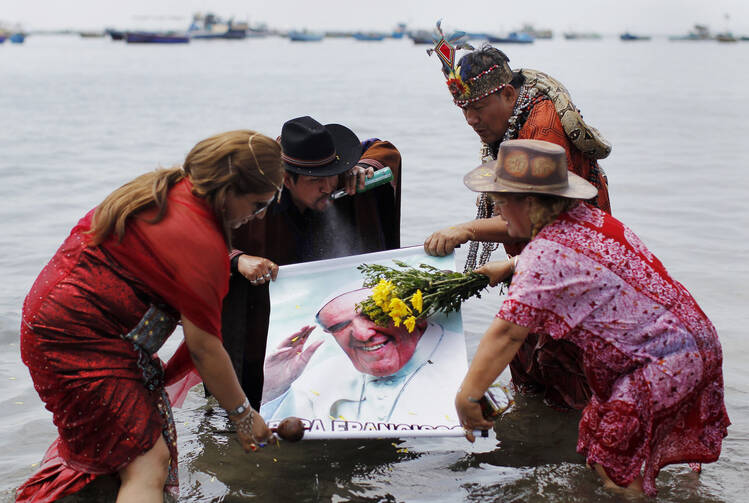New Hope in Cuba
Though the decision to re-engage with Cuba has outraged some in the exile community and certain U.S. politicians eyeing 2016, President Obama’s decision to seize the opportunity presented by the release of the imprisoned American Alan Gross was the right one. Isolation has been given 50 years to “work” in Cuba; that has been more than enough time to demonstrate its ineffectiveness.
In his announcement of the diplomatic shift on Dec. 17, President Obama acknowledged a simple fact the church has been pointing out for years: the only people being hurt by the unimaginative policy maintained by the United States have been the Cuban people themselves. Creating a failed state 90 miles off America’s shore is no way to resolve U.S. differences with the Castro brothers or humanely encourage change in that one-party state. While the embargo whittled down living standards in Cuba, the United States achieved historic breakthroughs with previous Communist adversaries, including China and the former Soviet Union. It is hard to make the case that it is unable to do the same with Cuba.
Pope Francis is to be applauded for his role in securing this major diplomatic success. The church has made great strides in its relationship with Cuban authorities in recent years. More important, because of this dialogue the church has progressively moved the Castro brothers to allow greater liberty and tolerance for religious expression. The process has been imperfect and much more needs to be done, but the enhanced encounter with the United States will surely have an accelerating effect on improving living standards and human rights in Cuba—an outcome to which nobody should object.
Progress at Guantánamo
After years of delay, the campaign to transfer detainees from the U.S. prison at Guantánamo Bay is finally gaining momentum. Since the beginning of 2014, 28 detainees have been moved, and the Vatican is exerting pressure on the United States to find “humanitarian solutions” for the remaining prisoners. Six captives were resettled in Uruguay in December, and five were transferrred to Kaszakhstan at the end of the year. These men had been imprisoned for over 10 years and were never charged with a crime.
As of this writing, 127 individuals remain imprisoned at Guantánamo. Of that number, 55 have been cleared for release or transfer. Most of these men cannot be repatriated because of the political instability of their home countries. Representative Howard McKeon, the Republican chair of the House Armed Services Committee, has expressed concerns about moving additional prisoners, but the individuals approved for release do not pose any security risk. They were cleared for release in 2009 by an interagency task force that included the departments of Defense, State, Justice and Homeland Security, in addition to the Central Intelligence Agency and the Federal Bureau of Investigation.
The Organization of American States is pushing for more Latin American countries to accept detainees. An added push from the Argentine pope’s diplomatic corps could help further the cause. But the United States must be willing to resettle detainees within its own borders as well. From both a practical and a moral perspective, the United States has to lead by example. Otherwise President Obama’s pledge to close the prison, which he promised to do on his first day of office, may remain unfulfilled on his last.
Outreach in Belarus
When Communism collapsed in the early 1990s, many foresaw a brighter future for those who had been trapped behind the Iron Curtain. While the past two decades have seen success stories in Eastern and Central Europe, most notably Poland, other nations continue to grapple with the vestiges of their totalitarian past. Belarus in particular faces grinding poverty, divorce and soaring alcoholism, as well as an atheistic philosophy that left in its wake one of the highest abortion rates in Europe. In an attempt to redress such issues, the church has stepped in to provide material and spiritual assistance to people in need.
It is not an easy task, as Magda Kaczmarek, a staff member of Aid to the Church in Need, told the Catholic News Agency. Many searching for support “are open to God” but “were not able or not allowed to live out their faith for any number of reasons.” She said the church is “committed to finding them, reminding them of their Catholic roots and offering them pastoral care once again.”
Efforts to reclaim church patrimony and re-establish places of worship confiscated during the Soviet era have been slowed by bureaucratic inertia. And while current President Alexander Lukashenko has not hindered the church’s charitable activities, the church does not receive state funding. Yet in partnership with the Orthodox Church—a positive development in itself—efforts are being made to patiently rebuild Belarusian society, sickened from extreme secularism. By coming to grips with the social ills of Belarus while also working to renew religious vocations, the church hopes to give the people living there a reason to believe again, in themselves and in God.








